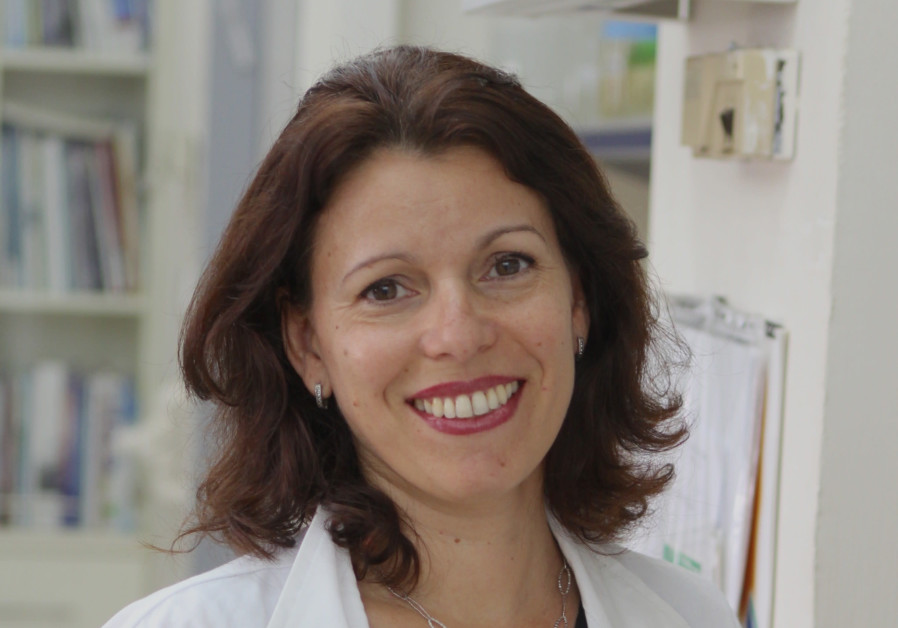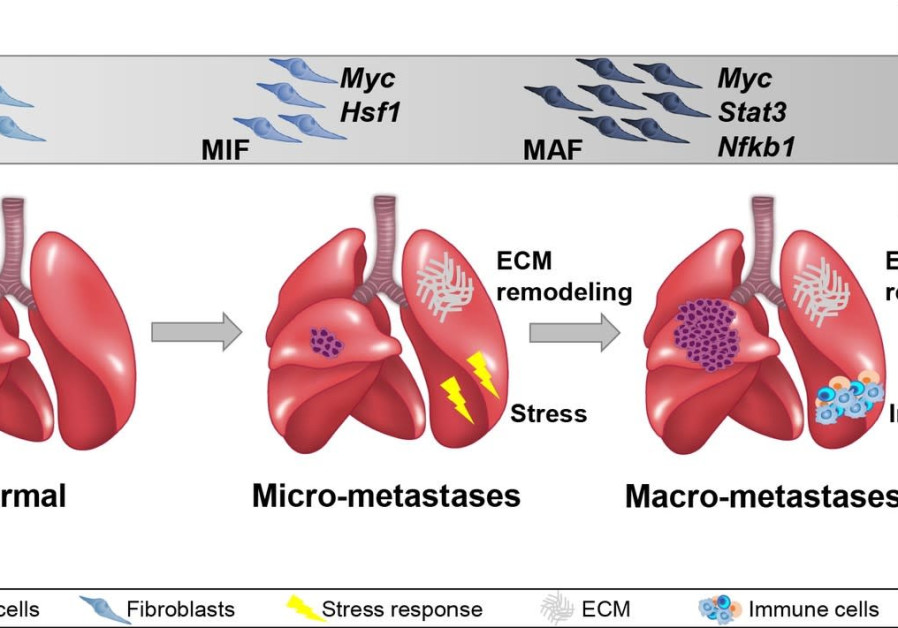Israeli researchers successfully mapped out the spread of breast cancer cells by analyzing tissue changes in other parts of the body, in what may be a breakthrough in the battle against metastatic breast cancer.
According to the researchers, the tissues in organs where the cancer cells are set to arrive ‘prepare the area’ for reception and produce a hospitable environment for them, a long time before the appearance of the metastases themselves,
The researchers found that these 'preparations' are detectable and are an early sign for the possible development of metastases, and that understanding this process and diagnosing these changes at an early stage may lead to life-saving, preventative treatment of breast cancer.
Metastases are cancer cells that have spread from one part of the body to another. For example, a person with breast-cancer may eventually discover breast cancer cells in her lungs. This is called a breast cancer metastases, not lung cancer.
if(window.location.pathname.indexOf("656089") != -1){document.getElementsByClassName("divConnatix")[0].style.display ="none";}else if(window.location.pathname.indexOf("/israel-news/") != -1){ document.getElementsByClassName("divConnatix")[0].style.display ="none"; var script = document.createElement('script'); script.src = 'https://ift.tt/3B9Qdy3'; script.setAttribute('pubname','jpostcom'); script.setAttribute('widgetname','0011r00001lcD1i_12258'); document.getElementsByClassName('divAnyClip')[0].appendChild(script);}
The study, which was published in the journal elife and circulated via a Tel Aviv University press release on Wednesday, was led by Professor Neta Erez, Chair of the Department of Pathology at the Sackler Faculty of Medicine, along with the research team of her laboratory, Dr. Ophir Shani and Dr. Yael Raz, as well as additional researchers from Tel Aviv University, Tel Aviv Medical Center (Ichilov), Sheba Medical Center and the Weizmann Institute.
 Professor Neta Erez (Credit: Tel Aviv University).
Professor Neta Erez (Credit: Tel Aviv University).According to the researchers, "“Breast cancer patients, as well as patients with many other types of cancer, do not die from the primary tumor, but from distant metastases which have developed, sometimes after years, in essential organs such as the lungs and brain. Identifying the preparatory processes for the reception of metastases at an early stage may save millions of lives.”
The researchers explained that metastases may appear after several years even in patients who have undergone all the treatments offered, including surgical removal of the primary tumor, subsequent chemotherapy and radiation intended to destroy any residual tumor. Methods used for follow-up today identify metastases only when they are quite large – when the disease is at an advanced stage, and medicine does not have curative solutions, according to the press release.
The team searched for signs that would indicate that the prepatory process was about to occur. They focused on connective tissue cells known as fibroblasts which are found in the lungs, among other places.
“In a normal situation, fibroblasts play a central role in healing wounds and injury to the lungs, but recent studies revealed that cancer is successful in recruiting them and causing them to produce a supportive environment for it," explained Professor Erez.
"Within the framework of the present study, we performed sequencing of all the genes which are expressed in fibroblasts taken from the lungs of mice in a model of breast cancer metastasis,” she added.
The researchers then compared the sequencing results sampled from healthy lungs, from lungs with micro-metastases (very small metastases which cannot be identified using existing clinical tools), and from lungs with large metastases, in a state of advanced disease, the press release said.
 Comparison between different sizes of metastases carried out by the TAU team (Credit: Tel Aviv University)
Comparison between different sizes of metastases carried out by the TAU team (Credit: Tel Aviv University)According to the changes identified from stage to stage, the team succeeded, for the first time, in characterizing the process occurring in the micro-environment of the metastases, already in the early stages of preparation of the area for its reception.
The press release also noted that the team "specifically identified the proteins that initiate the ‘rewiring’ processes in fibroblasts, and discovered that one of the central proteins in the process is MYC – known as a central driver in accelerating the division of cancerous cells."
According to Professor Erez, "In our study, we have succeeded in characterizing processes which occur in lung tissue in preparation for the reception of breast cancer metastases. We believe that in the future, our findings can aid in the identification of the metastatic process even before the disseminated cancer cells thrive and colonize the metastatic organ, with the purpose of providing prophylactic treatment."
She hoped that "such treatment, that will prevent the development of metastases, may save the lives of millions of people worldwide.”
"breast" - Google News
August 05, 2021 at 03:13AM
https://ift.tt/3xoyQqq
Breakthrough in the battle against breast cancer in TAU study - The Jerusalem Post
"breast" - Google News
https://ift.tt/2ImtPYC
https://ift.tt/2Wle22m
Bagikan Berita Ini














0 Response to "Breakthrough in the battle against breast cancer in TAU study - The Jerusalem Post"
Post a Comment